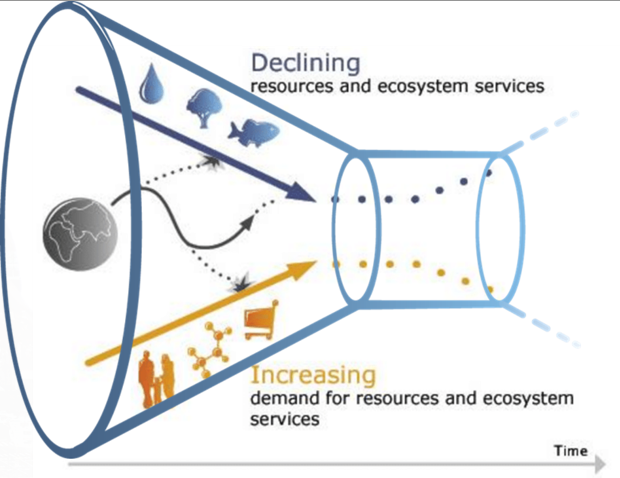Why is Sustainability Important?
Due to the increasing expectation from society, sustainability is being taken seriously at the highest levels of modern organizations, as seen by the rise of Chief Sustainability Officers (CSOs) in C-suites and Sustainability Committees in boardrooms. This is encouraging for those who have long believed in the value of articulating corporate purpose, assessing multinational companies' economic growth impacts, and closely observing the functioning of backbone business sectors like energy and natural resources, infrastructure services, and advanced technology industries.
While natural resources are decreasing due to excessive use of mineral resources, deforestation, and overfishing, the demand for resources is increasing due to population growth. If the destruction of our natural systems continues, living a comfortable life will become an increasingly difficult proposition. Just like the ever-narrowing walls of a funnel, businesses will in time face an ever-dwindling range of options, shorter time frames to respond and an ever growing need to economize. This will adversely impact the quality of our lives. A sustainable society becomes impossible.

Copyright® The Natural Step All right reserved
To thrive through these shrinking "walls," it is necessary to change the way businesses operate. The companies that simply follow the movements of other companies and industries and respond to changes are merely members competing for market share. To gain a competitive advantage in business, we must be the first company to realize sustainable management and design a way to overcome hitting the walls of the funnel. This will not only enable us to build a market advantage; it will ‘right to exist’ for the company.
Sustainability as Gaining a Competitive Edge2
According to a paper by Harvard Business School, which analyzed data from MSCI ESG Ratings; the world's largest provider of ESG data, a similar set of sustainability practices, which were adopted by many companies over the sample period, are less likely to serve as a strategic differentiator and more likely a strategic necessity. Adopting those standard sustainability practices is favorably associated with market valuation multiples but not with return on capital.
On the other hand, the paper shows that adopting strategic sustainability measures is significantly and favorably associated with both returns on capital and market valuation multiples. Sustainability can be both a requirement and a differentiator. Some sustainability actions have simply become "best practice" and thus are a requirement. However, the data reveals that some businesses are gaining a competitive edge by implementing sustainability measures that their competitors find difficult to replicate.
1Forbes, 10 Feb 2021, Talal Rafi, why corporate strategies should be focused on sustainability, Accessed 2 Nov 2021, https://www.forbes.com/sites/forbesbusinesscouncil/2021/02/10/why-corporate-strategies-should-be-focused-on-sustainability/?sh=53df7127e9f2
2HBR, 11 Feb 2019, Ioannis Ioannou and George Serafeim, Yes, Sustainability can be a strategy, Accessed 2 Nov 2021, < https://hbr.org/2019/02/yes-sustainability-can-be-a-strategy>
HBR, 21 Oct 2016, Tensie Whelan and Carly Fink, Business Case for Sustainability, Accessed 2 Nov 2021, < https://hbr.org/2016/10/the-comprehensive-business-case-for-sustainability>
Mckinsey, Nov 2019, Witold Henisz, Tim Koller, and Robin Nuttall, Five Ways that ESG creates Value, Accessed 2 Nov 2021, https://www.mckinsey.com/business-functions/strategy-and-corporate-finance/our-insights/five-ways-that-esg-creates-value
For more about this topic, download our latest book " Sustainability: The Inevitable Future " for FREE:
